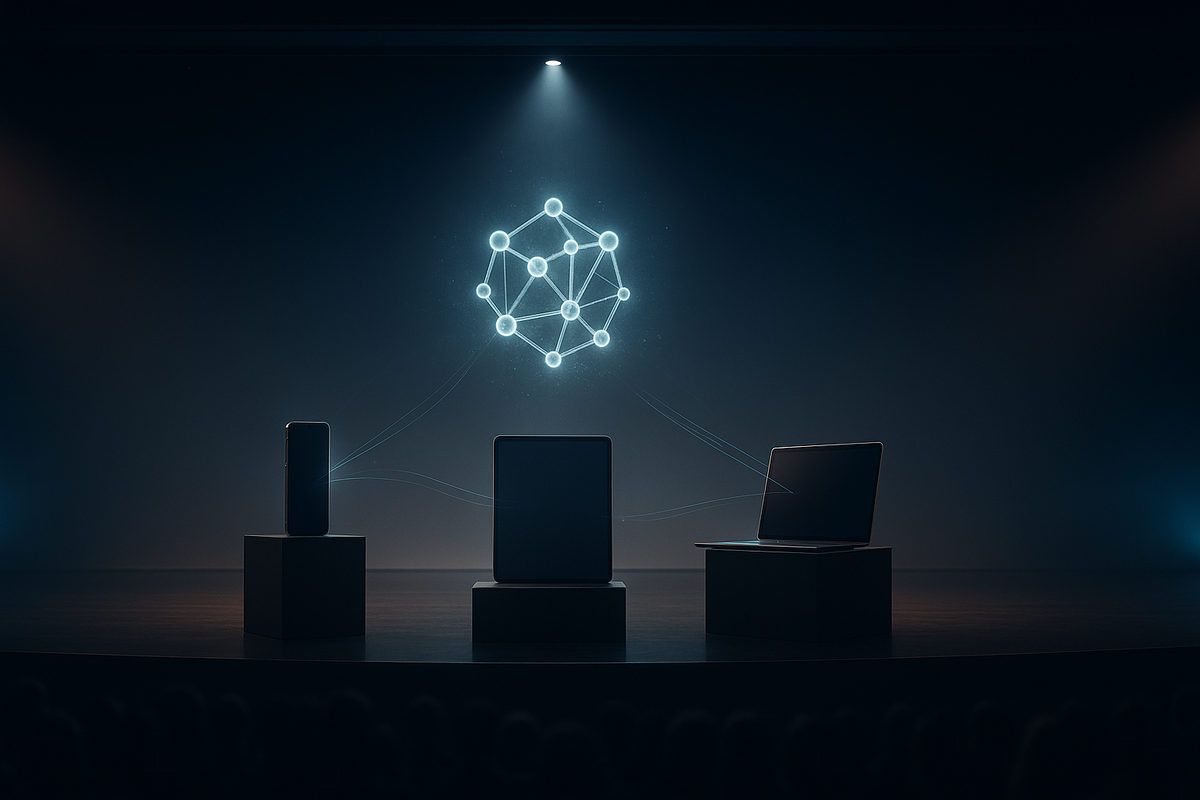Apple Unveils "Apple Intelligence" at WWDC25: A New Era of Personalized AI and Ecosystem Reinforcement

Apple Inc. (NASDAQ: AAPL) has once again captured the tech world's attention with the grand unveiling of "Apple Intelligence" at its annual Worldwide Developers Conference (WWDC25). This ambitious initiative signals Apple's aggressive push into the burgeoning artificial intelligence landscape, promising a suite of deeply integrated, privacy-centric AI features across its vast ecosystem of devices, including iPhone, iPad, and Mac. The announcement, which emphasized on-device processing and a cautious, incremental rollout, immediately sparked discussions about its potential to redefine user interaction, solidify Apple's market dominance, and accelerate a crucial hardware upgrade cycle.
The implications of "Apple Intelligence" extend far beyond mere feature enhancements; they represent a strategic pivot designed to reinforce Apple's competitive moat in an increasingly AI-driven market. By deeply embedding intelligent capabilities across its operating systems and applications, Apple aims to deliver a uniquely personalized and secure user experience. However, the staggered rollout of some key features, particularly the more advanced aspects of Siri, also suggests a measured approach, leaving room for competitors to innovate while Apple meticulously crafts its long-term AI vision.
The Dawn of "Apple Intelligence": A Privacy-First AI Revolution
WWDC25 served as the launchpad for Apple's expansive vision of "Apple Intelligence," an initiative designed to infuse advanced AI capabilities directly into the core of its operating systems and applications. This strategic move is not merely about adding new features; it's about fundamentally transforming how users interact with their devices, making them more intuitive, personalized, and proactive. The overarching theme of the unveiling was Apple's unwavering commitment to privacy, with a significant emphasis on on-device processing capabilities.
The conference showcased a comprehensive suite of "Apple Intelligence" features set to debut across iPhone, iPad, Mac, Apple Watch, and Apple Vision Pro. Key among these was the introduction of Live Translation, offering real-time language conversion for Messages, FaceTime, and phone calls, with all processing handled locally for enhanced privacy. Visual intelligence received a significant boost, enabling users to interact with on-screen content more intelligently, such as automatically extracting event details from images or searching for similar items across various apps. Creative tools also saw enhancements with updates to Image Playground and Genmoji, allowing for richer visual expression and even incorporating ChatGPT integration for image generation. Furthermore, Smarter Shortcuts and Automation are poised to make device interactions more seamless, leveraging both on-device and Private Cloud Compute models. Core applications like Mail, Messages, and Reminders will benefit from deep AI integration, offering features like text summarization, automatic sorting, and intelligent suggestions. While a more personalized, agent-style redesign of Siri was teased, its full rollout is notably delayed until 2026, signaling Apple's meticulous development approach. Apple also made its on-device foundation model accessible to developers via the Foundation Models framework, fostering a new era of intelligent, privacy-preserving third-party applications.
The timeline leading up to this moment has seen Apple gradually introduce AI elements into its ecosystem, from advanced photo processing to dictation, but WWDC25 marks a pivotal acceleration and consolidation of these efforts under the "Apple Intelligence" banner. Key players involved in this ambitious undertaking include Apple's hardware and software engineering teams, led by CEO Tim Cook, who has consistently championed a privacy-first philosophy. The initial market reaction has been largely positive, with analysts recognizing the potential for a significant hardware upgrade cycle. Devices equipped with A17-Pro chips or M-series processors (iPhone 15 Pro models and newer Macs/iPads) will be the exclusive beneficiaries of these advanced AI features, strategically prompting millions of users to upgrade their devices. This hardware gating is projected to drive substantial revenue growth for Apple in the coming fiscal years.
Navigating the AI Wave: Winners and Losers in the Tech Arena
Apple's aggressive foray into "Apple Intelligence" is poised to reshape the competitive landscape, creating clear winners and presenting significant challenges for others in the technology sector. The strategic emphasis on on-device processing and ecosystem integration will undoubtedly bolster Apple's already formidable position.
Apple Inc. (NASDAQ: AAPL) stands out as the primary winner. The introduction of "Apple Intelligence" is not just about new features; it's a powerful catalyst for a new hardware upgrade supercycle. By restricting the most advanced AI functionalities to devices powered by the A17 Pro chip or M-series processors, Apple effectively incentivizes users of older models to upgrade their iPhones, iPads, and Macs. Financial analysts predict this could translate into an additional 33 million iPhone units sold in fiscal year 2026, generating approximately $30 billion in revenue. Furthermore, the deep integration of these AI features across its hardware and software ecosystem will further entrench users within the Apple walled garden, making it even more challenging for them to switch to competing platforms. The privacy-first approach also strengthens Apple's brand appeal, differentiating it from rivals whose AI strategies often rely heavily on cloud-based processing and potentially raising data privacy concerns.
Developers within the Apple ecosystem are also significant beneficiaries. Apple's decision to open access to its on-device foundation model through the Foundation Models framework empowers developers to build intelligent, privacy-preserving, and offline-capable experiences directly into their apps. This initiative is expected to spark a new wave of innovation in the App Store, potentially leading to novel applications and services that leverage Apple Intelligence's capabilities, thereby enhancing the overall value proposition of the Apple ecosystem. The partnership with OpenAI, integrating ChatGPT into Siri and writing tools, also positions OpenAI to gain broader exposure and usage of its advanced language models among Apple's massive user base.
Conversely, other major tech players and certain segments of the industry may face renewed competitive pressure. Google (NASDAQ: GOOGL) and Samsung (KRX: 005930), while also investing heavily in AI, might find it challenging to immediately match Apple's deep integration and on-device processing capabilities, especially on their respective smartphone platforms. Apple's privacy-centric approach to AI could also force competitors to re-evaluate and more explicitly communicate their own data privacy practices, potentially increasing development costs or shifting public perception. Companies heavily reliant on traditional search and navigation for user discovery and advertising revenue may also see an impact as an enhanced Siri, powered by "Apple Intelligence," could allow users a more direct and conversational path to discover products and services, potentially bypassing traditional search engines.
Industry Tides Turning: Broader Implications of Apple's AI Offensive
Apple's unveiling of "Apple Intelligence" at WWDC25 is more than just a product announcement; it's a significant marker in the ongoing evolution of the technology industry, poised to exert ripple effects across various sectors and redefine competitive dynamics. This move firmly plants Apple at the forefront of the AI race, setting new benchmarks for integration, privacy, and user experience.
This event squarely fits into the broader industry trend of ubiquitous AI integration, yet with a distinct Apple flavor. While many tech giants have pursued cloud-first AI strategies, Apple's strong emphasis on on-device processing and its innovative Private Cloud Compute architecture introduces a compelling counter-narrative. This dual approach signifies a potential shift towards hybrid AI models where sensitive or rapid tasks are handled locally, while more complex or resource-intensive operations are offloaded to secure cloud infrastructure. This strategy challenges the prevailing cloud-centric AI paradigm and could inspire other companies to invest more heavily in edge computing capabilities, particularly for consumer devices where privacy and latency are paramount.
The ripple effects on competitors are undeniable. Companies like Google (NASDAQ: GOOGL), Microsoft (NASDAQ: MSFT), and Samsung (KRX: 005930) will be forced to respond with equally compelling and privacy-conscious AI solutions. Apple's commitment to hardware-gated AI features (requiring A17 Pro or M-series chips) could also influence competitor strategies, potentially leading to an accelerated arms race in mobile processor development. The deepening integration of ChatGPT from OpenAI into Apple's ecosystem, particularly within Siri and Writing Tools, underscores a willingness for strategic partnerships. This could set a precedent for other platform holders to collaborate with leading AI developers, rather than solely relying on in-house solutions, leading to more fragmented but potentially more advanced AI offerings across the industry.
From a regulatory standpoint, Apple's privacy-first messaging around "Apple Intelligence" is strategically advantageous. In an era of increasing scrutiny over data collection and AI ethics, Apple's emphasis on on-device processing and explicit user consent for data sharing with third-party AI providers like OpenAI positions it favorably. This could indirectly pressure regulators to establish clearer guidelines for data privacy in AI applications, potentially benefiting companies that prioritize user control and transparency. Historically, Apple has often led the charge in areas like privacy and security, and its AI strategy appears to be a continuation of this legacy. Comparisons can be drawn to Apple's early adoption of strong encryption or its App Tracking Transparency (ATT) framework, both of which prompted significant industry-wide shifts and regulatory discussions. The staggered rollout of more advanced Siri features also suggests a cautious, responsible approach to AI development, potentially mitigating risks associated with rushed deployments.
The Road Ahead: Navigating Apple's Intelligent Future
The unveiling of "Apple Intelligence" sets the stage for a dynamic period of innovation and adaptation within the tech industry. In the short-term, the immediate focus will be on the adoption rates of new Apple devices capable of running these advanced AI features. The anticipated upgrade cycle, driven by the exclusivity of "Apple Intelligence" to newer A17 Pro and M-series chips, will be a key metric for investors and analysts alike. Apple will also be meticulously rolling out its initial suite of AI enhancements, gathering user feedback, and refining the algorithms. The success of features like Live Translation, enhanced Visual Intelligence, and integrated Writing Tools will be crucial in demonstrating the tangible benefits of its AI investment.
Looking further ahead, the long-term possibilities are immense. The full realization of Apple's AI vision, particularly with the more personalized and agent-style redesign of Siri expected in 2026, could fundamentally alter how users interact with technology. Siri, once considered a weakness, has the potential to become a central, intelligent assistant capable of proactive support and deeply contextual understanding across the entire Apple ecosystem. This could open up new avenues for user engagement, content discovery, and even subtle monetization strategies through enhanced service offerings. Strategic pivots or adaptations required for Apple will likely involve continued heavy investment in R&D for both AI software and specialized hardware (Neural Engines), as well as navigating the complexities of integrating third-party AI models while maintaining its stringent privacy standards.
Market opportunities will emerge not only for Apple but also for developers who can leverage the Foundation Models framework to create innovative, AI-powered applications. Third-party app developers who successfully integrate "Apple Intelligence" capabilities will likely gain a competitive edge. Conversely, challenges may arise for competitors attempting to catch up with Apple's deep, on-device AI integration and privacy-centric approach. Potential scenarios range from Apple solidifying its position as the undisputed leader in consumer AI, driving unprecedented ecosystem stickiness, to a more fragmented market where various tech giants carve out niches based on their AI philosophies (e.g., cloud-first vs. edge-first). The success of Apple's Private Cloud Compute will also be a critical factor, as it aims to scale advanced AI capabilities securely while preserving user privacy.
Conclusion: Apple's Defining Moment in the Age of AI
Apple's ambitious unveiling of "Apple Intelligence" at WWDC25 marks a pivotal moment, not just for the Cupertino giant but for the entire technology landscape. This comprehensive AI initiative underscores Apple's strategic intent to redefine the user experience through deeply integrated, personalized, and, crucially, privacy-centric artificial intelligence. By leveraging its powerful silicon and tightly controlled ecosystem, Apple is setting a new standard for how AI can enhance everyday interactions, from real-time translation to smarter shortcuts and creative content generation.
The immediate takeaway from this event is clear: Apple is making a decisive move to solidify its market position and accelerate hardware upgrade cycles. The exclusivity of "Apple Intelligence" to its latest-generation processors (A17 Pro and M-series) is a masterstroke designed to drive significant sales of new iPhones, iPads, and Macs. Beyond the financial implications, Apple's unwavering emphasis on on-device processing and its innovative Private Cloud Compute architecture serve as a powerful differentiator, appealing to a growing consumer base concerned about data privacy and security. This strategy positions Apple as a leader in responsible AI development, potentially influencing industry-wide practices and regulatory discussions.
Moving forward, investors should closely watch several key indicators. The adoption rates of new, AI-capable Apple devices will be paramount, as will the pace and success of the rollout of more advanced "Apple Intelligence" features, particularly the enhanced Siri in 2026. The engagement of the developer community with the Foundation Models framework will also be crucial, as a thriving ecosystem of AI-powered third-party apps will amplify the value proposition of Apple's platform. While competitors will undoubtedly respond with their own AI advancements, Apple's integrated hardware-software approach and privacy-first philosophy provide a formidable moat. The long-term significance of "Apple Intelligence" lies in its potential to not only redefine personal computing but also to reinforce Apple's brand as the trusted custodian of user data in the rapidly evolving age of artificial intelligence.



